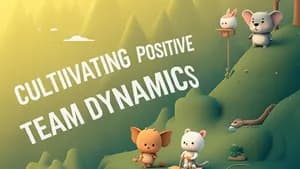Personality Types & Team Dynamics: Understanding & Leveraging Differences
Welcome to the exciting world of teamwork! You've probably heard the saying, "There's strength in numbers." And it's true. Working together, whether in school projects, extracurricular activities, or even just a family project, can unlock incredible achievements. But, just like a team of athletes needs different players for different positions, a successful team is made up of individuals with diverse personalities, strengths, and approaches. Understanding these differences is key to unlocking the true power of teamwork.
The Power of Personality Types
Have you ever noticed that some people seem naturally drawn to leadership roles, while others prefer to work behind the scenes? Or that some thrive on structured plans, while others flourish in a more flexible environment? These are just a few examples of how personality types influence our interactions and contributions within a team.
Think of personality types as different flavors of ice cream: each one is unique and delicious, but when you combine them, you create something truly special! Let's explore some common personality types you might encounter in your own teams:
- The Leader: These individuals are often charismatic, confident, and driven to motivate others. They excel at setting goals, delegating tasks, and inspiring their team members.
- The Creative Thinker: These individuals are often imaginative, innovative, and enjoy exploring new ideas. They bring fresh perspectives and solutions to the table.
- The Detail-Oriented Individual: These individuals are meticulous, organized, and value accuracy. They are essential for ensuring projects are completed efficiently and effectively.
- The Team Player: These individuals are collaborative, supportive, and prioritize the success of the entire team. They are excellent at fostering positive relationships and ensuring everyone feels valued.
Recognizing and Leveraging Differences
Now that you've got a better understanding of different personality types, how can you use this knowledge to improve your team dynamic? Here's the secret sauce: Embrace the unique strengths of each individual! Think of it like building a puzzle – each piece is different but essential for creating the complete picture.
Here are some practical tips for leveraging personality differences:
- Appreciate Individual Contributions: Recognize and acknowledge the unique strengths that each teammate brings to the table. If someone is particularly creative, give them space to brainstorm new ideas. If someone is highly organized, encourage them to lead the task management and planning.
- Communicate Effectively: Open and honest communication is vital. Encourage everyone to share their thoughts, ideas, and concerns openly. Active listening and respectful feedback are key to building trust and understanding.
- Embrace Diversity of Thought: Welcome different perspectives and approaches. Don't be afraid to challenge assumptions and explore new ideas. Remember, diversity in thought can lead to innovative solutions!
- Celebrate Successes: Acknowledge and celebrate team accomplishments. This reinforces a sense of shared purpose and motivates everyone to continue working together.
Fostering a Culture of Inclusion
A key ingredient for a successful team is a culture of inclusivity. It's about creating an environment where everyone feels valued, respected, and empowered to contribute. Here are some tips for creating a welcoming and inclusive atmosphere:
- Active Listening: Pay attention to what your team members say, both verbally and nonverbally. Make eye contact, ask clarifying questions, and show that you genuinely care about their contributions.
- Respectful Communication: Be mindful of your words and actions. Avoid making generalizations or stereotypes, and use inclusive language. Be sensitive to cultural and individual differences.
- Value Everyone's Input: Encourage everyone to share their thoughts and ideas, regardless of their role or experience. Create a space where everyone feels comfortable expressing their opinions.
- Acknowledge Differences: Be open to different perspectives and experiences. Recognize that everyone has something valuable to offer, even if their approach differs from yours.
Creating a Respectful Team Environment
It's important to create a team environment that fosters respect and appreciation for each individual. This means creating a safe and supportive space where everyone feels comfortable being themselves. Here are some ways to achieve this:
- Clear Communication: Establish clear expectations and communication channels. This ensures everyone understands their roles and responsibilities. It also reduces misunderstandings and conflicts.
- Conflict Resolution: Develop effective strategies for resolving conflicts. Encourage open dialogue, active listening, and compromise. Remember, healthy disagreements can lead to constructive solutions.
- Celebrate Diversity: Embrace the unique talents and backgrounds of your team members. Create opportunities for team members to share their cultures, interests, and experiences.
Conclusion: Unleashing the Power of Teamwork
Understanding personality types and creating a positive team dynamic is a journey, not a destination. It requires ongoing effort, communication, and a willingness to adapt and grow. Remember, a team is more than just a group of individuals; it's a collaborative force with the potential to achieve incredible things. By appreciating individual strengths, fostering inclusivity, and building a culture of respect, you can unleash the true power of teamwork and achieve extraordinary results.
As you navigate your own team experiences, keep in mind the valuable lessons we've learned today. Embrace diversity, communicate effectively, and remember that each member of your team has something unique and valuable to offer. Together, you can create a team that achieves amazing things!

